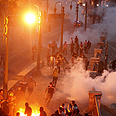
Riot police fired tear gas at rock-throwing protesters in central Cairo on Monday, a day after Egypt's president declared a state of emergency in three provinces hit hardest by political violence and vowed to deal "firmly and forcefully" with the unrest roiling the country.
The eruption of violence, which began around Friday's second anniversary of the uprising that toppled longtime ruler Hosni Mubarak, has plunged Egypt once again into political turmoil and exposed the deep fault lines running through the country.
Related Stories:
- Egypt's leader declares emergency after clashes kill 49 9 die in Egypt violence on anniversary of uprising
-
Egypt: 30 dead in riots over stadium disaster verdict
More than 50 people have been killed in the unrest, which is fueled by anger over the policies of the country's new Islamist leader and the slow pace of change.
Egyptian President Mohamed Morsi, who has struggled to address the country's daunting social and economic problems since taking power in June, declared in a televised speech late Sunday a 30-day state of emergency in the cities of Port Said, Ismailiya and Suez and their surrounding provinces in an attempt to quell the unrest.
The military was deployed in Suez on Friday and in Port Said the next day. The two cities have been hit the hardest by the violence.
Protesters in all three cities poured into the streets after Morsi's speech to reject both him and his state of emergency, which includes a curfew from 9 pm to 6 am In Port Said, where 44 people were killed in rioting over the weekend, at least 2,000 protesters chanted against the Egyptian president and the Muslim Brotherhood, the Islamist group from which he hails.
The unrest in Port Said was sparked by a court conviction and death sentence for 21 defendants involved in a mass soccer riot in the city's main stadium on February 1, 2012 that left 74 dead. Most of those sentenced to death were local soccer fans from Port Said, deepening a sense of persecution that Port Said's residents have felt since the stadium disaster, the worst soccer violence ever in Egypt.
In his televised address, Morsi also warned that he would not hesitate to take more action to stem the violence.
Angry and at times screaming and wagging his finger, the Egyptian leader also invited the nation's political forces for talks to resolve the nation's crisis, saying "a dialogue between the sons of the nation is indispensable and is the only way to shepherd Egypt to security and stability."
Among those invited to Monday's talks is pro-reform leader and Nobel peace laureate Mohammed ElBaradei and other leaders of the National Salvation Front, an umbrella group of opposition parties.
The invitation, however, was met with little enthusiasm from the opposition leaders.
"Any dialogue is a waste of time unless the president acknowledges his responsibility for the bloody events, pledges to form a national salvation government and a balance commission to amend the constitution," ElBaradei wrote on Twitter early on Monday.
Another Salvation Front leader, the leftist Hamdeen Sabahi, set conditions on his participation: "Halt the bloodletting, respect for the popular will and placing political solutions ahead of security measures are conditions for a serious dialogue."
ElBaradei, Sabahi and other opposition leaders have boycotted Morsi's previous calls for dialogue, saying he did not have the political will to effect change.
Salvation Front leaders are meeting later on Monday, when they are expected to decide whether to participate in the dialogue.
- Receive Ynetnews updates
directly to your desktop















